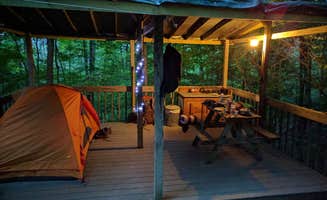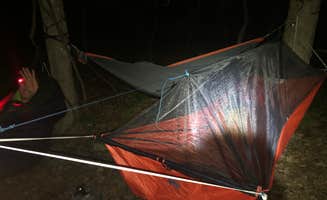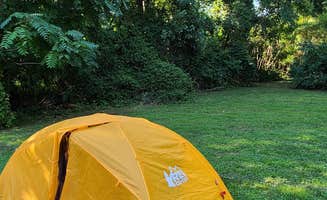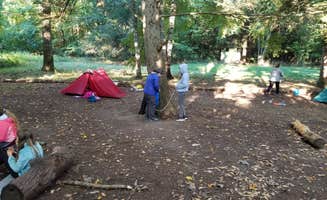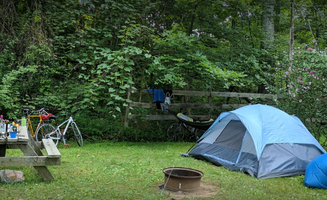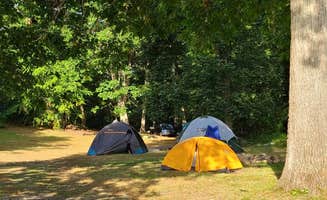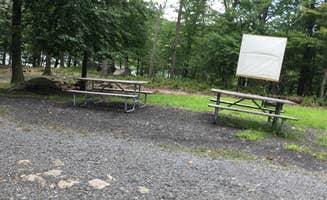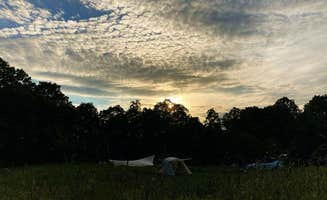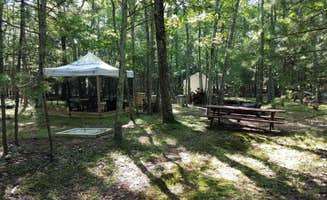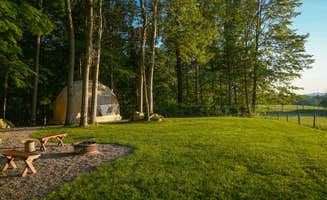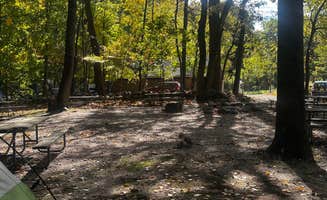Tent camping near Glenham, New York ranges from primitive sites in dense Appalachian forests to more established campgrounds along the Hudson River Valley. The region sits at elevations between 200-1,300 feet, with summer temperatures averaging 75-85°F days and 55-65°F nights. Most campsites experience moderate humidity with occasional summer thunderstorms, particularly in July and August when rainfall averages 4-5 inches monthly.
What to do
Climbing at Shawangunk Ridge: Access world-class rock climbing routes from Samuel F. Pryor III Shawangunk Gateway Campground, a popular base for climbers. "Love this campground! Have been here several times and have never had a complaint... Located really close to the Gunks for climbing and also some great hikes around the area," notes Jackie B.
Hiking trail networks: Explore over 40 miles of marked trails at Ward Pound Ridge Reservation, with paths suitable for all skill levels. One camper mentioned, "The best part of this campsite are the endless trails in the area... Would definitely recommend for those who want to camp near NYC but not drive too far."
Seasonal water activities: Take advantage of swimming areas at many locations, particularly in warmer months. "Sebago has a huge lake and great beach area. It was perfect for lounging and swimming in during a hot summer day," says Ethan K. about the facilities within Harriman State Park.
What campers like
Walk-in site privacy: Many tent campers prefer the walk-in sites for better seclusion. "I definitely recommend trying to get the walk-in sites (8-15) because they're just a little bit more set back and kind of wonderfully wooded all around," writes Kelsey R. about her stay at Samuel F. Pryor III Shawangunk Gateway Campground.
Well-maintained shelters: Some campgrounds offer lean-to shelters as alternatives to tent camping. "The shelters are great for people who want to camp and not have to worry about unplanned weather," reports Ethan K. about Ward Pound Ridge Reservation.
Affordable dispersed options: Budget-conscious campers appreciate the free primitive sites. At Hemlock Ridge MUA, Dawn M. found that "There are absolutely no amenities whatsoever & barely even a signal here, but it's quiet & off the beaten path. The parking lot only holds about 4-5 cars, 6 if you park real tight."
What you should know
Limited parking at primitive sites: Plan to arrive early at smaller campgrounds. At Hemlock Ridge MUA, one camper noted the "small(10 car) parking lot and a trail that runs thru 80 acres of forest. Camping is allowed anywhere 150ft from the trail."
Seasonal restrictions: Several campgrounds close during winter or when snow is present. "Please be aware that, although the website says they are open in March, they will not open if there is snow on the ground," warns Cory D. about his experience at Croton Point Park.
Bear activity requirements: Food storage is strictly regulated throughout the region. Kelsey R. observed, "With all the heavy bear traffic signs that were up, I was surprised to see how close bear boxes were to our tents. They seemed to be 1-10 feet away from tents in each campsite."
Environmental conditions: Be prepared for seasonal challenges. One camper at Hemlock Ridge warned that "Bugs are relentless" while another mentioned that many areas have "Normal LNT rules apply."
Tips for camping with families
Proximity to playgrounds: Some campgrounds offer designated play areas for children. Thomas noted about Croton Point Park, "Peaceful and gorgeous campsite, with plenty of space between sites. Great view of the Hudson, and playground within sight of our camper."
Educational opportunities: Look for nature programs and ranger activities. Several campgrounds offer weekend events like "outdoor movies and communal bonfires on weekends," according to Sara P.
Cabin alternatives: For families new to camping, consider rustic cabins as an introduction to outdoor experiences. At West Point FMWR Lake Frederick, Heather M. explains, "Between rustic power-only campsites that give you a true camping experience and upgraded but still simple cabins which allow campers of all ages and abilities to enjoy the outdoor experience, there is something for everyone."
Clean facilities: Most established campgrounds maintain reliable bathroom facilities. "The bath house is always well stocked and clean, ready for end of the day cleanup and the laundry facilities are a great bonus for those of us who like to stay longer than a couple days," notes a reviewer at Lake Frederick.
Tips from RVers
Limited RV options: The Glenham area offers fewer full-service RV sites than tent camping options. At Croton Point Park, one camper mentioned, "We had a loosely defined gravel pad that was level. All sites appeared level. The FHU sites were back-to-back and although there were trees separating the sites, they were close together."
Hook-up locations: Research site-specific amenities before arriving. Some campgrounds have partial hookups only, as one reviewer noted, "This place was extremely manicured. There is no eating at the campsite, they would prefer you cook and eat by the showers, the lights go off at a certain time."
Reservation requirements: Many locations require advance bookings and have specific check-in procedures. One camper observed, "The reservation process is a bit wonky. You need to call (no online reservations) and then wait for an e-mail, but the e-mail does not tell you your assigned site; you have to wait until you check in to find out your site."


